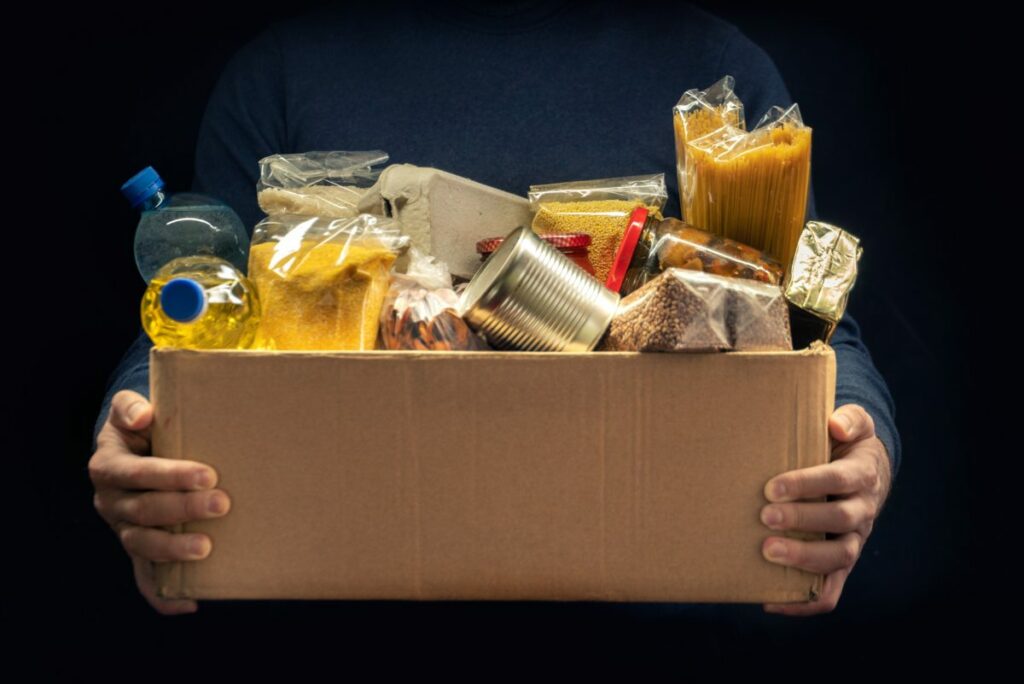Donating food to a food bank may seem like the right thing to do, but there are several things you need to understand before doing so. Experienced philanthropists understand that, first and foremost, donating food is not as simple as dropping off a bag of groceries. There are many complexities involved in running a food bank and ensuring that donated food is safe and used efficiently.

What Does a Food Bank Do?
A food bank is a nonprofit organization that provides food to people struggling to make ends meet. The food is typically donated by businesses or individuals and then distributed to people in need through various programs, such as food pantries, soup kitchens, and emergency shelters. Food banks play a vital role in combating hunger and food insecurity, but they cannot do it alone. They rely on the generosity of donors to stock their shelves and provide the food that people in need so desperately require.
How to Donate Food to a Food Bank
When donating food to a food bank, it is crucial to consider the type of foods most needed by those who will be receiving the donations. Non-perishable items such as canned goods, dry goods, and other shelf-stable items are always in high demand. Fresh produce and frozen foods are also needed but may require special storage or distribution considerations.
It is also essential to make sure that the food you donate is safe and in good condition. Food that is past its expiration date or that has been opened and partially consumed should not be donated. The same goes for home-cooked food, as food safety regulations make it difficult for food banks to accept these donations.
The Complexities of Running a Food Bank
The complexities of running a food bank can include everything from food safety concerns to managing a large volume of donations. Ensuring that donated food is stored correctly and distributed is vital to the success of any food bank.
Another complexity of running a food bank is dealing with the constant ebb and flow of donations. Some food banks receive a large influx of donations during the holiday season, only to see those donations dwindle in the months that follow. This can make it challenging to provide consistent services to those who rely on the food bank for assistance.
Food Waste and How it Affects Food Banks
Food waste is a primary concern for food banks, as wasted food takes away from resources that could be used to help those in need. When donating food, it is crucial to ensure that the items are still safe to eat and will not go to waste.
Here are a few things to consider:
- Shelf-stable foods and non-perishable items are always in high demand at food banks.
- Canned goods, dry goods, and other shelf-stable items are typically safe from spoilage and can be stored for long periods.
- Fresh produce and frozen foods may require special storage or distribution considerations.
- Food that is past its expiration date or that has been opened and partially consumed should not be donated.
- Home-cooked food is often difficult for food banks to accept due to food safety regulations.
- Dealing with the constant ebb and flow of donations can be a significant challenge for food banks.
Food Donation Myths Busted
There are many myths surrounding food donation, such as believing that all packaged foods are automatically safe to donate. However, it is essential to check expiration dates and donate only items still within their shelf life 6. Proper food storage is vital for keeping donated food safe and fresh. Canned goods should be stored in a cool, dry place and should not be dented or damaged. Fresh produce should be stored in the refrigerator and used within a few days. Frozen foods should be kept frozen until they are ready to be donated.
What Should You Donate to Your Local Food Bank
Food banks rely on the generosity of donors to stock their shelves and provide the food that people in need so desperately require. When donating food to a food bank, it is crucial to consider the type of foods most needed by those who will be receiving the donations. Non-perishable items such as canned goods, dry goods, and other shelf-stable items are always in high demand. Fresh produce and frozen foods are also needed but may require special storage or distribution considerations. It is also essential to make sure that the food you donate is safe and in good condition. Food that is past its expiration date or that has been opened and partially consumed should not be donated.
One crucial consideration when picking foods to donate is that the people receiving these donations probably have a similar palette to you. So using a food bank to clear unwanted canned foods out of your pantry is perhaps not the best idea. When it comes to canned foods, it’s better to donate the lower sodium options, especially when donating condensed soups, as the standard recipes can be a little high in sodium.
One of the best things you can do is ask your food bank what kinds of things they need. Rather than just guessing and donating willy nilly, you can donate items the food bank knows will be wanted and needed by their clientele.
Some of the best things you can donate are
- Canned fish and lean meats.
- Peanut butter / other nut butter.
- Healthy soups and stews.
- Whole grain breakfast cereals.
- Canned or dried beans.
- Pasta sauce and canned tomatoes.
- Shelf-stable milk.
- Baby food.
- Whole grains.
- Canned vegetables.
Final Thoughts
Food banks provide an essential service for those struggling to make ends meet. By donating healthy, shelf-stable foods to your local food bank, you can help families in your community have access to nutritious meals. Some of the best things you can donate include canned fish and meats, peanut butter, whole-grain breakfast cereals, canned beans, pasta sauce and tomatoes, and shelf-stable milk. When donating food items, it is essential to consider what the food bank needs most to put your donations to good use.




